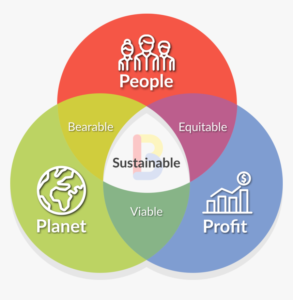From Missionary Zeal to Business Reality
February 6, 2023 2023-02-28 6:31From Missionary Zeal to Business Reality

From Missionary Zeal to Business Reality
Only healthy soils created by regenerative agricultural practices, which restore the bio-dynamic systems in the soil, can yield the correct food. Additionally, harmful compounds that are the root of many chronic and degenerative diseases are absent from organic meals. This article is a component of Conjoncture’s new economic paradigm, which was developed in response to risks to human and environmental health brought on by prevailing capitalist industrial systems and economies.
Regenerative agriculture is significant because it reduces the demand for fossil fuels and gets rid of toxic fertilizer and pesticide waste, which has a negative influence on the environment. Adopting regenerative techniques, however, needs to be supported by a financial and economic structure that directs money to such ground-breaking initiatives. In this radical effort to save the earth, the farming community must be a key player.
In the first part of this series, we study how business models must change to reflect the new game realities. A romantic endeavor has been associated with permaculture and other restorative techniques. It must be shown that such fringe endeavors may integrate into the agricultural mainstream, despite the fact that the effects on human health, the soil, and society are clear.
From GDP to One-Earth Balance Sheet
Politicians and economists accepted formulae that emphasized growth at the expense of nature. No one listened to early warnings, such as those provided by the Club of Rome’s Limits to Growth. According to the most recent report of the United Nations Intergovernmental Panel on Climate Change (IPCC), humanity is now on red alert.
The economic system prioritizes value creation for humans alone, ignoring resource depletion, biodiversity loss, pollution, and, most importantly, global warming. A “One-Earth Balance Sheet” was required in order to accurately and fairly account for Earth’s natural resources and biodiversity.
Impact evaluation and integrated reporting are increasingly becoming standard practices for large firms that follow the new corporate governance concepts. However, it is still not fully accepted by international financial markets and recognized in strategic planning. According to the most recent OECD study on natural capital and biodiversity, only 34 countries have created ecosystem accounts, and most are only partially developed.
Redirecting Capital Flows
The rising awareness of environmental risks has led to an increase in interest in nature-based solutions (NbS). Financial markets have been affected, involving private, public, and international participants. There will be more knowledge of NbS prospects as the markets mature.
In addition to developing a new financial architecture and credit improvement tools, multilateral organizations are advancing the environmental agenda. For instance, UNEP’s “Invest in a Healthy Planet” argues in favor of funding agriculture and forests, which only receive 3% of all climate investment. When financing this transition, the way has been blocked by exorbitant costs and financial risk for lenders and investors.
Investments made with the goal of producing both a good, quantifiable social and environmental impact and a financial return are referred to as sustainable finance. Around $2 trillion is thought to be the market size for potential private impact investors’ combined assets. The adoption of cryptocurrency to support the permaculture community, known as Permacredits, is an intriguing move that may complement impact investing markets.
Sustainable business models
The language of choice for organizations to construct and communicate their strategic framework to stakeholders is the business model. Osterwalder and Pigneur created and popularized the Business Model Canvas toolbox. It quickly became well-known among businesspeople as a go-to tool for creating innovative strategies.
A service named Indigo Carbon was introduced by Indigo Ag, a US-based agricultural technology start-up with a $1.4 billion valuation in 2017, to encourage farmers to capture carbon from the atmosphere and store it in their soil. The ultimate objective is to compensate farmers for each ton of carbon sequestered, and then to market certifications to businesses wishing to reduce their carbon footprints.
Consulting companies regularly do research on the Business Model for Sustainability (BMfS), in addition to “pracademics” (academic practitioners). ESG (Environment, Social, and Governance) indicators are being used by financial institutions in their analysis of green or sustainability funding.
People, Planet and Profit

As the climate issue worsens and poses threats to both human existence and the planet, it is becoming increasingly clear that business for profit alone will eventually go out of style and that BMfS will eventually take its place as the standard method for evaluating businesses in general. For those working in regenerative agriculture, who will be leading the charge to triumph in this ongoing conflict, this is of immense relevance.
To create a sustainable society that is more livable for the planet and people, more viable for businesses and the environment, and more equitable in terms of revenue distribution, “People, Planet, and Profit” will be the new motto for businesses.
The world became acutely aware of the stark reality that the globe is rapidly approaching a point beyond which it can no longer be saved with the release of the UN-IPCC report. In no small part, agriculture is to blame for the climatic catastrophe and the decline in biodiversity. Importantly, it is creating food that cannot be consumed by people.
Financial institutions and the business community must embrace the struggle for survival in order to reroute capital flows to the areas where they are most needed. The idea behind regenerative agriculture is to save the earth by bringing the soil back to health. It also calls for new economic paradigms that prioritize promoting people and the earth over profits alone.
By Deva Armoogum
Search

